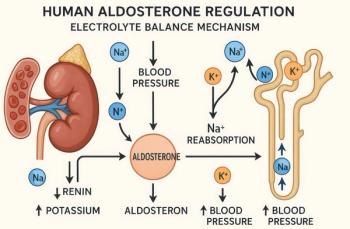
When Medicine Isn’t Enough: Renal Sympathetic Denervation and Resistant Hypertension
What newer options are available to lower blood pressure in resistant hypertension? What about renal sympathetic denervation?
For hypertensive patients who adhere to therapy but who remain above target blood pressure despite a 3-drug regimen-the so-called resistant hypertensives-additional agents, such as spironolactone, are added. Despite 4 or even 5 drugs, however, some members of this complication-prone cohort remain above their target. They can exhibit left ventricular hypertrophy (LVH) and diastolic dysfunction, both of which have been linked to cardiovascular complications.
What newer options are available to lower their blood pressure? What about renal sympathetic denervation?
Previous studies have demonstrated that percutaneous radiofrequency ablation of afferent and efferent sympathetic nerves to the kidneys can decrease blood pressure in resistant hypertensives.1 Since the presence of LVH increases cardiovascular risk, could regression of LV muscle mass also be a benefit of the procedure?
Forty-six patients underwent bilateral renal denervation and were compared with 18 patients considered their controls.2 All patients underwent transthoracic echocardiography at baseline and then again at 1 and 6 months. The effect on blood pressure in the denervation group was striking: there were reductions in systolic and diastolic pressures at 1 and 6 months, respectively, of 22.5/7.2 mm Hg (1 month) and 27.8/8.8 mm Hg (6 months). Interventricular septal thickness and LV mass index both decreased as well (septal thickness from 14.1 mm to 13.4 mm at 1 month and 12.5 mm at 6 months; and LV mass index from 53.9 to 47 at 1 month and 44.7 at 6 months). Markers for diastolic function (the mitral valve lateral E/E’ and isovolumic relaxation time) were also improved significantly. In addition, ejection fraction increased in the denervation group.
The authors’ discussion of the results was informative. They observed that lowering of blood pressure per se is a surrogate end point. That is, the lowering of blood pressure must decrease cardiovascular morbidity and mortality . . . hard, important end points. If blood pressure decreases with treatment, but survival is not affected, treatment is not really efficacious. In this regard, with renal denervation specifically, blood pressure lowering was accompanied by a potentially “hard” benefit and outcome-LVH regression. Since LVH and diastolic dysfunction increase morbidity and mortality, denervation may provide benefits that certain antihypertensives do not (atenolol or other beta-blockers, for example).
Take home point: Larger, longer studies are sure to follow. Even though this study was small, relatively short, and lacked a control group treated with another regimen known to be efficacious in resistant hypertension, watch renal sympathetic denervation as an evolution in blood pressure management.
References:
1. Krum H, Schlaich M, Whitbourn R, et al. Catheter-based renal sympathetic denervation for resistant hypertension: a multicentre safety and proof-of-principle cohort study. Lancet. 2009;373:1275-1281.
2. Brandt MC, Mahfoud F, Reda S, et al. Renal sympathetic denervation reduces left ventricular hypertrophy and improves cardiac function in patients with resistant hypertension. J Am Coll Cardiol. 2012;59:901-909.
Newsletter
Enhance your clinical practice with the Patient Care newsletter, offering the latest evidence-based guidelines, diagnostic insights, and treatment strategies for primary care physicians.
































































































































